Analyzing Negative Impacts: Parental Pressure on Children in Sports
VerifiedAdded on 2023/05/27
|8
|1718
|273
Essay
AI Summary
This essay examines the negative impacts of parental pressure on children involved in sports, highlighting issues such as self-esteem problems, burnout, resentment, and the danger of sports-related injuries. It argues that while sports offer benefits like exercise and teamwork, excessive parental pressure can lead to detrimental outcomes. Children may develop low self-esteem due to constant failure, experience burnout and lose interest in sports, and resent their parents for forcing them into activities they dislike. Furthermore, pushing children too hard can increase their vulnerability to injuries. The essay concludes that parents should allow children to choose their own activities and hobbies to foster a healthier and more positive relationship, promoting overall well-being and preventing negative emotional and physical consequences.

Running head: SPORTS
SPORTS
Name of the student:
Name of the university:
Author note:
SPORTS
Name of the student:
Name of the university:
Author note:
Paraphrase This Document
Need a fresh take? Get an instant paraphrase of this document with our AI Paraphraser
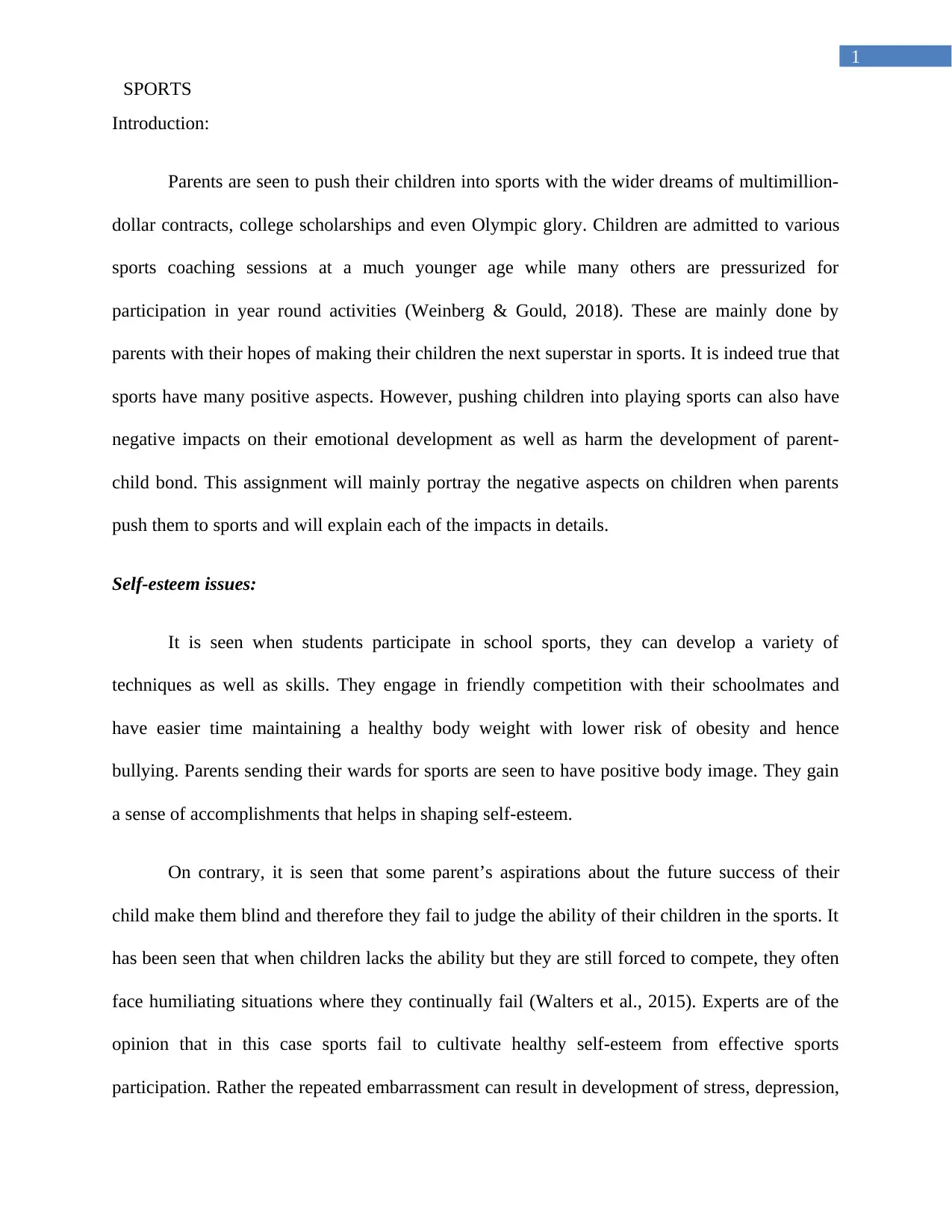
1
SPORTS
Introduction:
Parents are seen to push their children into sports with the wider dreams of multimillion-
dollar contracts, college scholarships and even Olympic glory. Children are admitted to various
sports coaching sessions at a much younger age while many others are pressurized for
participation in year round activities (Weinberg & Gould, 2018). These are mainly done by
parents with their hopes of making their children the next superstar in sports. It is indeed true that
sports have many positive aspects. However, pushing children into playing sports can also have
negative impacts on their emotional development as well as harm the development of parent-
child bond. This assignment will mainly portray the negative aspects on children when parents
push them to sports and will explain each of the impacts in details.
Self-esteem issues:
It is seen when students participate in school sports, they can develop a variety of
techniques as well as skills. They engage in friendly competition with their schoolmates and
have easier time maintaining a healthy body weight with lower risk of obesity and hence
bullying. Parents sending their wards for sports are seen to have positive body image. They gain
a sense of accomplishments that helps in shaping self-esteem.
On contrary, it is seen that some parent’s aspirations about the future success of their
child make them blind and therefore they fail to judge the ability of their children in the sports. It
has been seen that when children lacks the ability but they are still forced to compete, they often
face humiliating situations where they continually fail (Walters et al., 2015). Experts are of the
opinion that in this case sports fail to cultivate healthy self-esteem from effective sports
participation. Rather the repeated embarrassment can result in development of stress, depression,
SPORTS
Introduction:
Parents are seen to push their children into sports with the wider dreams of multimillion-
dollar contracts, college scholarships and even Olympic glory. Children are admitted to various
sports coaching sessions at a much younger age while many others are pressurized for
participation in year round activities (Weinberg & Gould, 2018). These are mainly done by
parents with their hopes of making their children the next superstar in sports. It is indeed true that
sports have many positive aspects. However, pushing children into playing sports can also have
negative impacts on their emotional development as well as harm the development of parent-
child bond. This assignment will mainly portray the negative aspects on children when parents
push them to sports and will explain each of the impacts in details.
Self-esteem issues:
It is seen when students participate in school sports, they can develop a variety of
techniques as well as skills. They engage in friendly competition with their schoolmates and
have easier time maintaining a healthy body weight with lower risk of obesity and hence
bullying. Parents sending their wards for sports are seen to have positive body image. They gain
a sense of accomplishments that helps in shaping self-esteem.
On contrary, it is seen that some parent’s aspirations about the future success of their
child make them blind and therefore they fail to judge the ability of their children in the sports. It
has been seen that when children lacks the ability but they are still forced to compete, they often
face humiliating situations where they continually fail (Walters et al., 2015). Experts are of the
opinion that in this case sports fail to cultivate healthy self-esteem from effective sports
participation. Rather the repeated embarrassment can result in development of stress, depression,
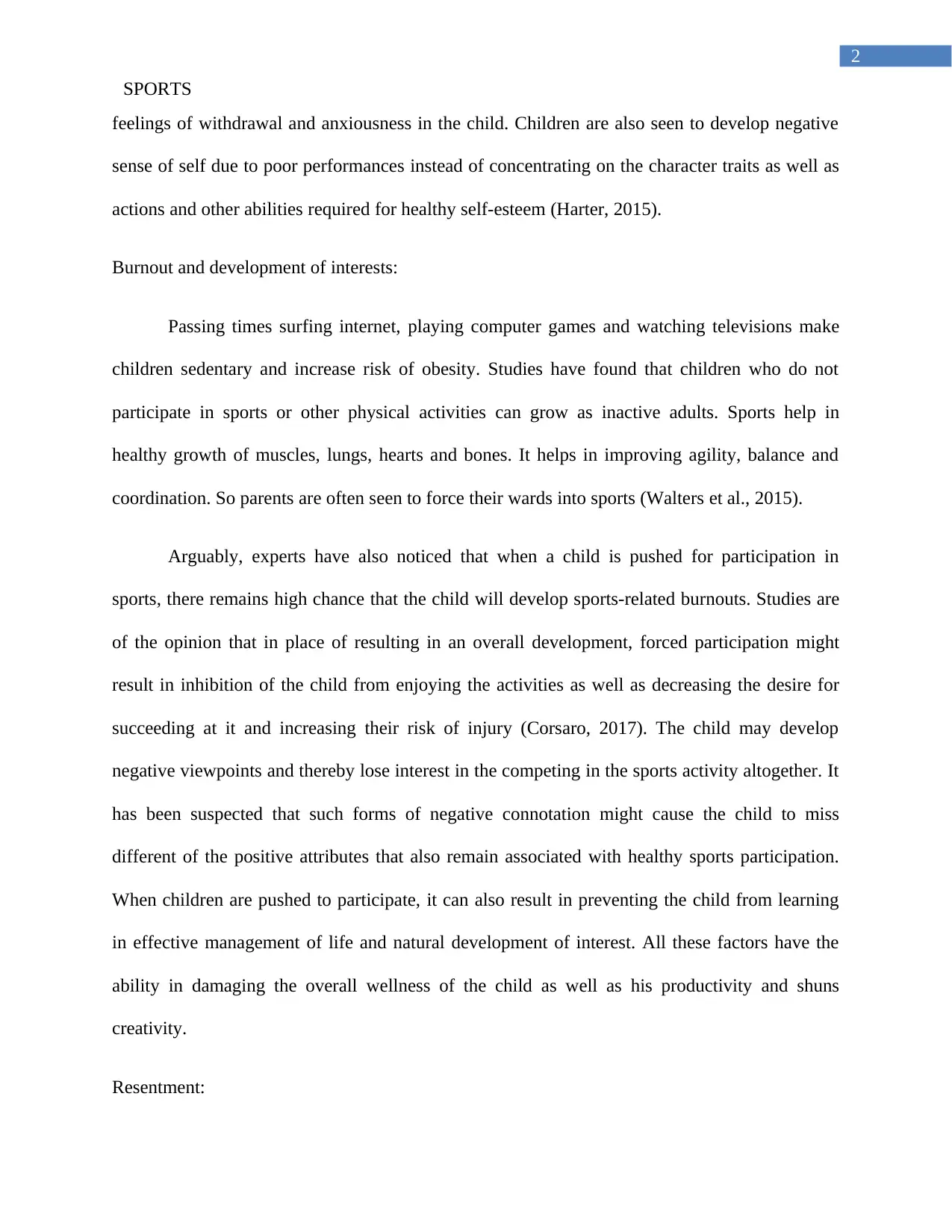
2
SPORTS
feelings of withdrawal and anxiousness in the child. Children are also seen to develop negative
sense of self due to poor performances instead of concentrating on the character traits as well as
actions and other abilities required for healthy self-esteem (Harter, 2015).
Burnout and development of interests:
Passing times surfing internet, playing computer games and watching televisions make
children sedentary and increase risk of obesity. Studies have found that children who do not
participate in sports or other physical activities can grow as inactive adults. Sports help in
healthy growth of muscles, lungs, hearts and bones. It helps in improving agility, balance and
coordination. So parents are often seen to force their wards into sports (Walters et al., 2015).
Arguably, experts have also noticed that when a child is pushed for participation in
sports, there remains high chance that the child will develop sports-related burnouts. Studies are
of the opinion that in place of resulting in an overall development, forced participation might
result in inhibition of the child from enjoying the activities as well as decreasing the desire for
succeeding at it and increasing their risk of injury (Corsaro, 2017). The child may develop
negative viewpoints and thereby lose interest in the competing in the sports activity altogether. It
has been suspected that such forms of negative connotation might cause the child to miss
different of the positive attributes that also remain associated with healthy sports participation.
When children are pushed to participate, it can also result in preventing the child from learning
in effective management of life and natural development of interest. All these factors have the
ability in damaging the overall wellness of the child as well as his productivity and shuns
creativity.
Resentment:
SPORTS
feelings of withdrawal and anxiousness in the child. Children are also seen to develop negative
sense of self due to poor performances instead of concentrating on the character traits as well as
actions and other abilities required for healthy self-esteem (Harter, 2015).
Burnout and development of interests:
Passing times surfing internet, playing computer games and watching televisions make
children sedentary and increase risk of obesity. Studies have found that children who do not
participate in sports or other physical activities can grow as inactive adults. Sports help in
healthy growth of muscles, lungs, hearts and bones. It helps in improving agility, balance and
coordination. So parents are often seen to force their wards into sports (Walters et al., 2015).
Arguably, experts have also noticed that when a child is pushed for participation in
sports, there remains high chance that the child will develop sports-related burnouts. Studies are
of the opinion that in place of resulting in an overall development, forced participation might
result in inhibition of the child from enjoying the activities as well as decreasing the desire for
succeeding at it and increasing their risk of injury (Corsaro, 2017). The child may develop
negative viewpoints and thereby lose interest in the competing in the sports activity altogether. It
has been suspected that such forms of negative connotation might cause the child to miss
different of the positive attributes that also remain associated with healthy sports participation.
When children are pushed to participate, it can also result in preventing the child from learning
in effective management of life and natural development of interest. All these factors have the
ability in damaging the overall wellness of the child as well as his productivity and shuns
creativity.
Resentment:
⊘ This is a preview!⊘
Do you want full access?
Subscribe today to unlock all pages.

Trusted by 1+ million students worldwide
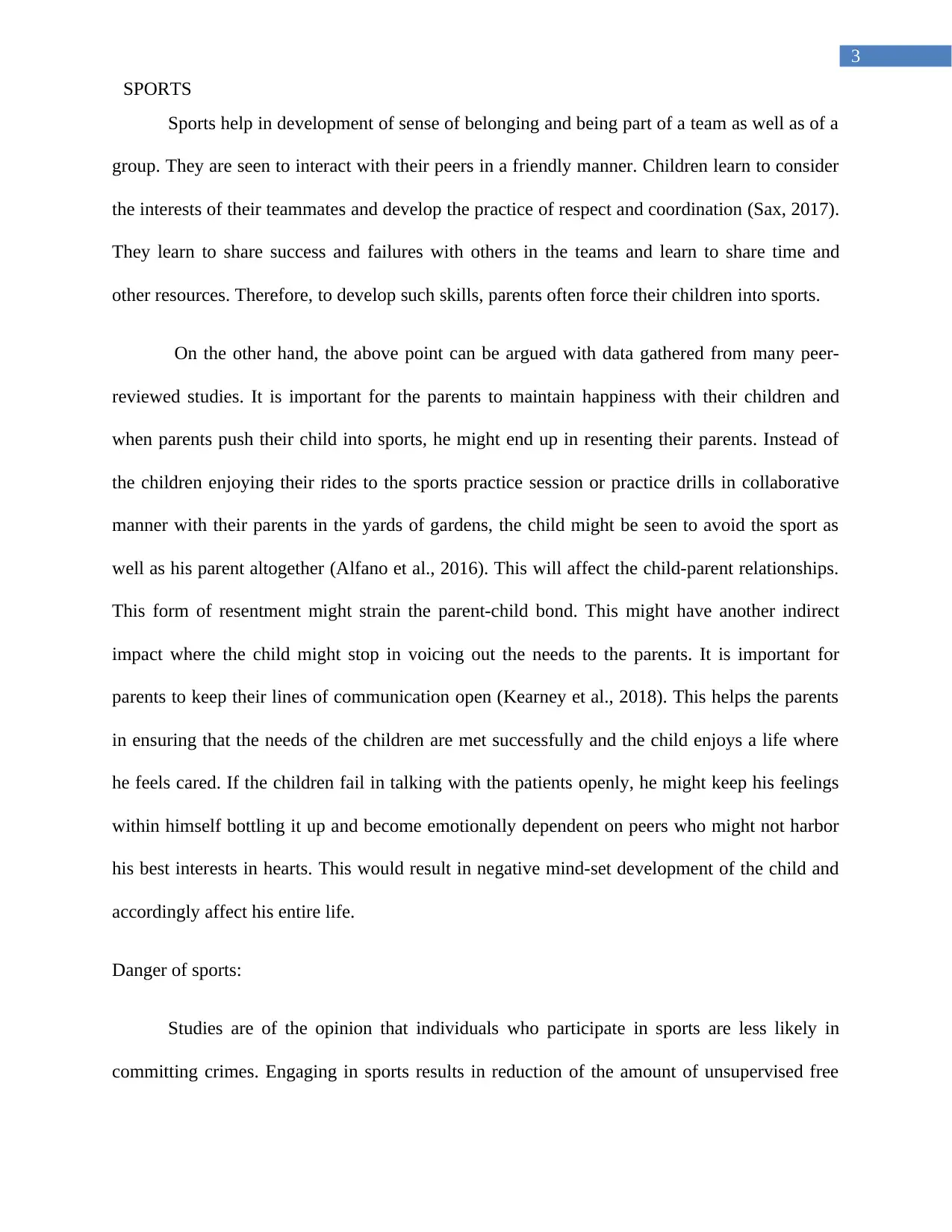
3
SPORTS
Sports help in development of sense of belonging and being part of a team as well as of a
group. They are seen to interact with their peers in a friendly manner. Children learn to consider
the interests of their teammates and develop the practice of respect and coordination (Sax, 2017).
They learn to share success and failures with others in the teams and learn to share time and
other resources. Therefore, to develop such skills, parents often force their children into sports.
On the other hand, the above point can be argued with data gathered from many peer-
reviewed studies. It is important for the parents to maintain happiness with their children and
when parents push their child into sports, he might end up in resenting their parents. Instead of
the children enjoying their rides to the sports practice session or practice drills in collaborative
manner with their parents in the yards of gardens, the child might be seen to avoid the sport as
well as his parent altogether (Alfano et al., 2016). This will affect the child-parent relationships.
This form of resentment might strain the parent-child bond. This might have another indirect
impact where the child might stop in voicing out the needs to the parents. It is important for
parents to keep their lines of communication open (Kearney et al., 2018). This helps the parents
in ensuring that the needs of the children are met successfully and the child enjoys a life where
he feels cared. If the children fail in talking with the patients openly, he might keep his feelings
within himself bottling it up and become emotionally dependent on peers who might not harbor
his best interests in hearts. This would result in negative mind-set development of the child and
accordingly affect his entire life.
Danger of sports:
Studies are of the opinion that individuals who participate in sports are less likely in
committing crimes. Engaging in sports results in reduction of the amount of unsupervised free
SPORTS
Sports help in development of sense of belonging and being part of a team as well as of a
group. They are seen to interact with their peers in a friendly manner. Children learn to consider
the interests of their teammates and develop the practice of respect and coordination (Sax, 2017).
They learn to share success and failures with others in the teams and learn to share time and
other resources. Therefore, to develop such skills, parents often force their children into sports.
On the other hand, the above point can be argued with data gathered from many peer-
reviewed studies. It is important for the parents to maintain happiness with their children and
when parents push their child into sports, he might end up in resenting their parents. Instead of
the children enjoying their rides to the sports practice session or practice drills in collaborative
manner with their parents in the yards of gardens, the child might be seen to avoid the sport as
well as his parent altogether (Alfano et al., 2016). This will affect the child-parent relationships.
This form of resentment might strain the parent-child bond. This might have another indirect
impact where the child might stop in voicing out the needs to the parents. It is important for
parents to keep their lines of communication open (Kearney et al., 2018). This helps the parents
in ensuring that the needs of the children are met successfully and the child enjoys a life where
he feels cared. If the children fail in talking with the patients openly, he might keep his feelings
within himself bottling it up and become emotionally dependent on peers who might not harbor
his best interests in hearts. This would result in negative mind-set development of the child and
accordingly affect his entire life.
Danger of sports:
Studies are of the opinion that individuals who participate in sports are less likely in
committing crimes. Engaging in sports results in reduction of the amount of unsupervised free
Paraphrase This Document
Need a fresh take? Get an instant paraphrase of this document with our AI Paraphraser
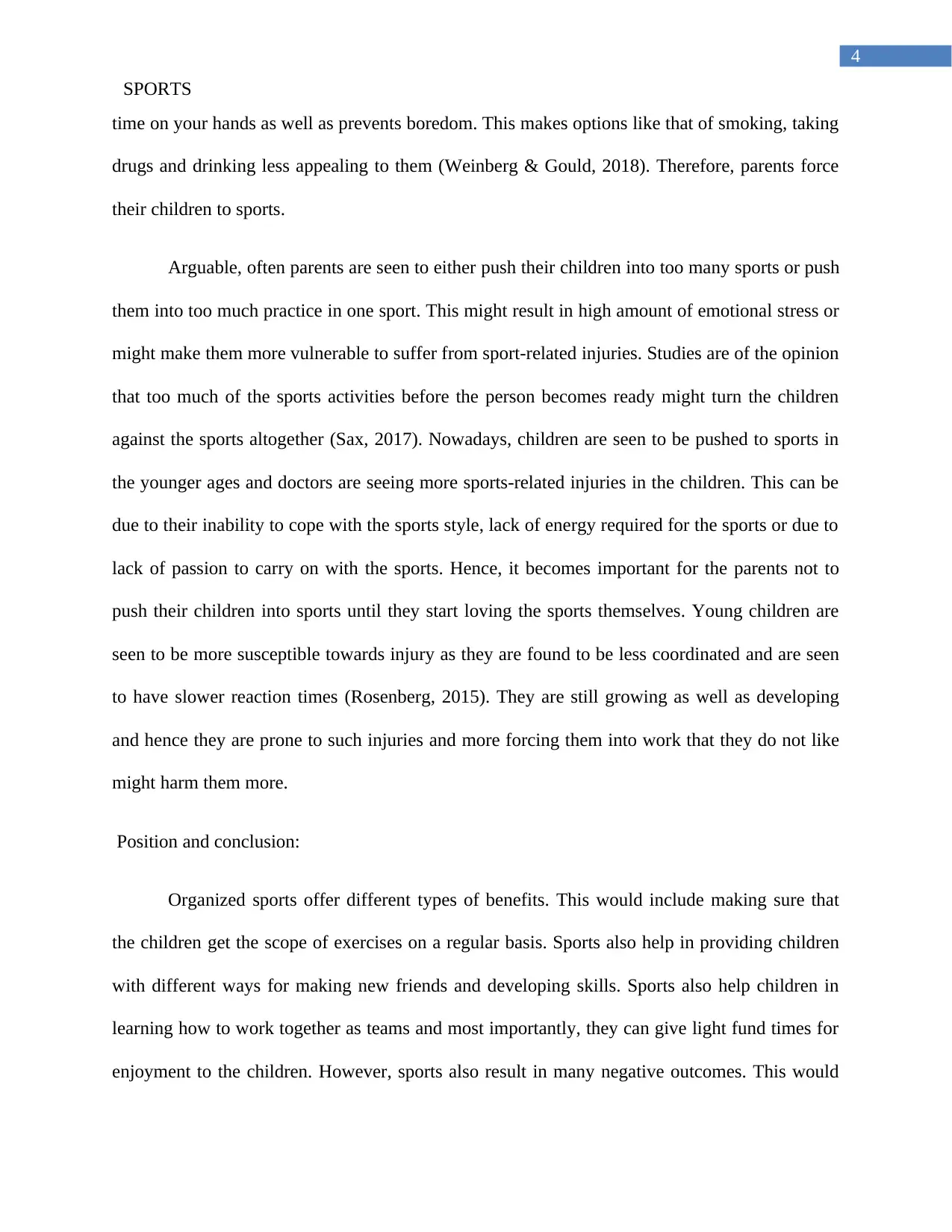
4
SPORTS
time on your hands as well as prevents boredom. This makes options like that of smoking, taking
drugs and drinking less appealing to them (Weinberg & Gould, 2018). Therefore, parents force
their children to sports.
Arguable, often parents are seen to either push their children into too many sports or push
them into too much practice in one sport. This might result in high amount of emotional stress or
might make them more vulnerable to suffer from sport-related injuries. Studies are of the opinion
that too much of the sports activities before the person becomes ready might turn the children
against the sports altogether (Sax, 2017). Nowadays, children are seen to be pushed to sports in
the younger ages and doctors are seeing more sports-related injuries in the children. This can be
due to their inability to cope with the sports style, lack of energy required for the sports or due to
lack of passion to carry on with the sports. Hence, it becomes important for the parents not to
push their children into sports until they start loving the sports themselves. Young children are
seen to be more susceptible towards injury as they are found to be less coordinated and are seen
to have slower reaction times (Rosenberg, 2015). They are still growing as well as developing
and hence they are prone to such injuries and more forcing them into work that they do not like
might harm them more.
Position and conclusion:
Organized sports offer different types of benefits. This would include making sure that
the children get the scope of exercises on a regular basis. Sports also help in providing children
with different ways for making new friends and developing skills. Sports also help children in
learning how to work together as teams and most importantly, they can give light fund times for
enjoyment to the children. However, sports also result in many negative outcomes. This would
SPORTS
time on your hands as well as prevents boredom. This makes options like that of smoking, taking
drugs and drinking less appealing to them (Weinberg & Gould, 2018). Therefore, parents force
their children to sports.
Arguable, often parents are seen to either push their children into too many sports or push
them into too much practice in one sport. This might result in high amount of emotional stress or
might make them more vulnerable to suffer from sport-related injuries. Studies are of the opinion
that too much of the sports activities before the person becomes ready might turn the children
against the sports altogether (Sax, 2017). Nowadays, children are seen to be pushed to sports in
the younger ages and doctors are seeing more sports-related injuries in the children. This can be
due to their inability to cope with the sports style, lack of energy required for the sports or due to
lack of passion to carry on with the sports. Hence, it becomes important for the parents not to
push their children into sports until they start loving the sports themselves. Young children are
seen to be more susceptible towards injury as they are found to be less coordinated and are seen
to have slower reaction times (Rosenberg, 2015). They are still growing as well as developing
and hence they are prone to such injuries and more forcing them into work that they do not like
might harm them more.
Position and conclusion:
Organized sports offer different types of benefits. This would include making sure that
the children get the scope of exercises on a regular basis. Sports also help in providing children
with different ways for making new friends and developing skills. Sports also help children in
learning how to work together as teams and most importantly, they can give light fund times for
enjoyment to the children. However, sports also result in many negative outcomes. This would
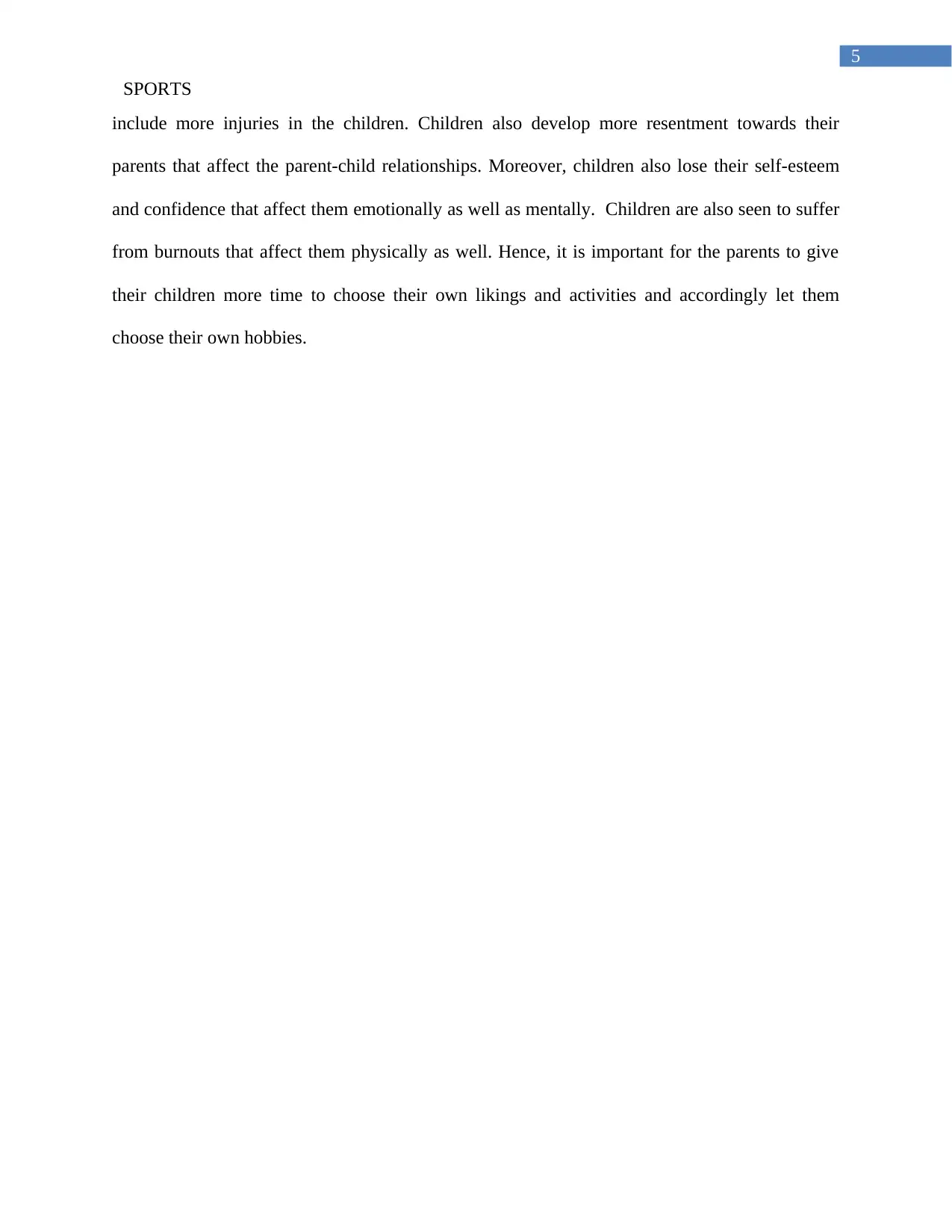
5
SPORTS
include more injuries in the children. Children also develop more resentment towards their
parents that affect the parent-child relationships. Moreover, children also lose their self-esteem
and confidence that affect them emotionally as well as mentally. Children are also seen to suffer
from burnouts that affect them physically as well. Hence, it is important for the parents to give
their children more time to choose their own likings and activities and accordingly let them
choose their own hobbies.
SPORTS
include more injuries in the children. Children also develop more resentment towards their
parents that affect the parent-child relationships. Moreover, children also lose their self-esteem
and confidence that affect them emotionally as well as mentally. Children are also seen to suffer
from burnouts that affect them physically as well. Hence, it is important for the parents to give
their children more time to choose their own likings and activities and accordingly let them
choose their own hobbies.
⊘ This is a preview!⊘
Do you want full access?
Subscribe today to unlock all pages.

Trusted by 1+ million students worldwide
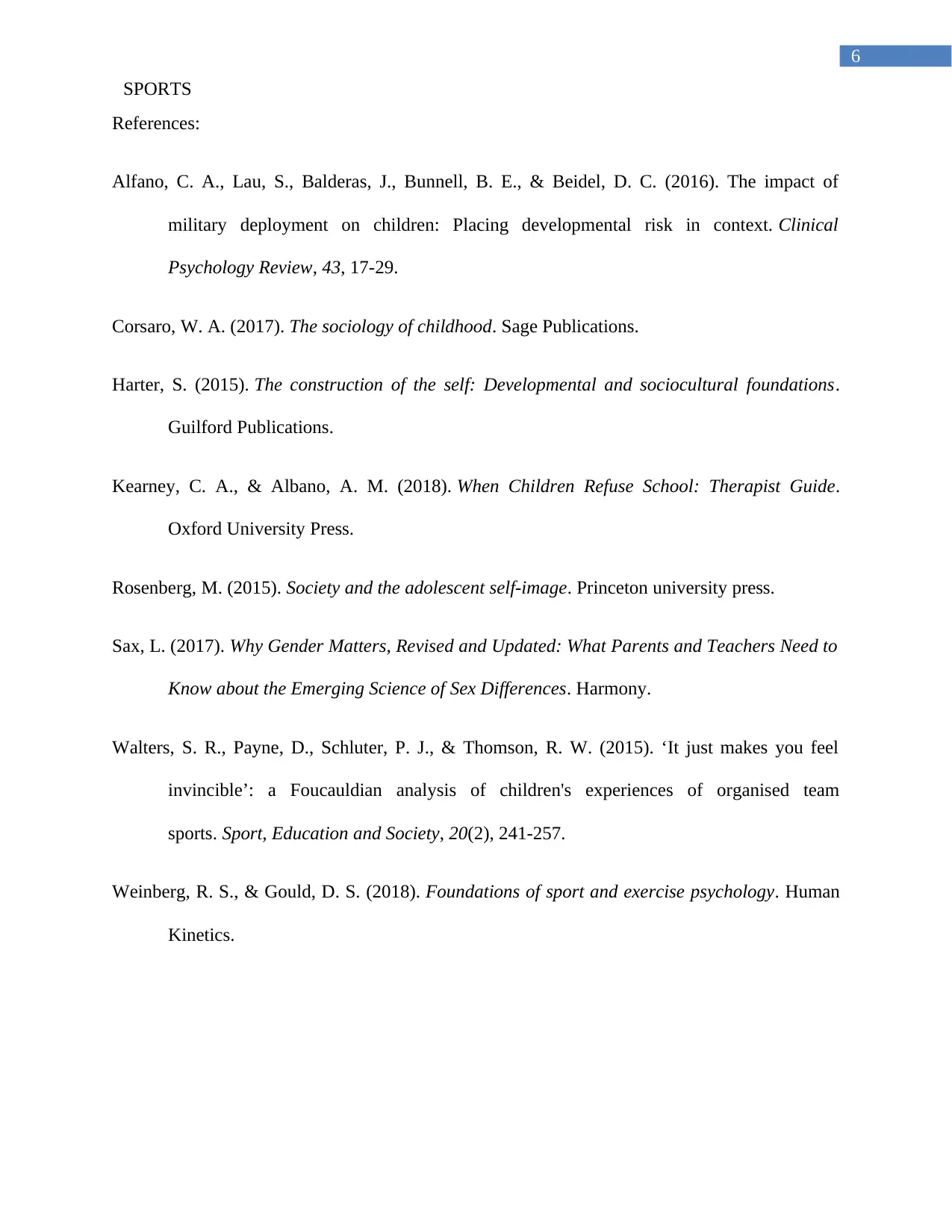
6
SPORTS
References:
Alfano, C. A., Lau, S., Balderas, J., Bunnell, B. E., & Beidel, D. C. (2016). The impact of
military deployment on children: Placing developmental risk in context. Clinical
Psychology Review, 43, 17-29.
Corsaro, W. A. (2017). The sociology of childhood. Sage Publications.
Harter, S. (2015). The construction of the self: Developmental and sociocultural foundations.
Guilford Publications.
Kearney, C. A., & Albano, A. M. (2018). When Children Refuse School: Therapist Guide.
Oxford University Press.
Rosenberg, M. (2015). Society and the adolescent self-image. Princeton university press.
Sax, L. (2017). Why Gender Matters, Revised and Updated: What Parents and Teachers Need to
Know about the Emerging Science of Sex Differences. Harmony.
Walters, S. R., Payne, D., Schluter, P. J., & Thomson, R. W. (2015). ‘It just makes you feel
invincible’: a Foucauldian analysis of children's experiences of organised team
sports. Sport, Education and Society, 20(2), 241-257.
Weinberg, R. S., & Gould, D. S. (2018). Foundations of sport and exercise psychology. Human
Kinetics.
SPORTS
References:
Alfano, C. A., Lau, S., Balderas, J., Bunnell, B. E., & Beidel, D. C. (2016). The impact of
military deployment on children: Placing developmental risk in context. Clinical
Psychology Review, 43, 17-29.
Corsaro, W. A. (2017). The sociology of childhood. Sage Publications.
Harter, S. (2015). The construction of the self: Developmental and sociocultural foundations.
Guilford Publications.
Kearney, C. A., & Albano, A. M. (2018). When Children Refuse School: Therapist Guide.
Oxford University Press.
Rosenberg, M. (2015). Society and the adolescent self-image. Princeton university press.
Sax, L. (2017). Why Gender Matters, Revised and Updated: What Parents and Teachers Need to
Know about the Emerging Science of Sex Differences. Harmony.
Walters, S. R., Payne, D., Schluter, P. J., & Thomson, R. W. (2015). ‘It just makes you feel
invincible’: a Foucauldian analysis of children's experiences of organised team
sports. Sport, Education and Society, 20(2), 241-257.
Weinberg, R. S., & Gould, D. S. (2018). Foundations of sport and exercise psychology. Human
Kinetics.
Paraphrase This Document
Need a fresh take? Get an instant paraphrase of this document with our AI Paraphraser

7
SPORTS
SPORTS
1 out of 8
Related Documents
Your All-in-One AI-Powered Toolkit for Academic Success.
+13062052269
info@desklib.com
Available 24*7 on WhatsApp / Email
![[object Object]](/_next/static/media/star-bottom.7253800d.svg)
Unlock your academic potential
Copyright © 2020–2026 A2Z Services. All Rights Reserved. Developed and managed by ZUCOL.





